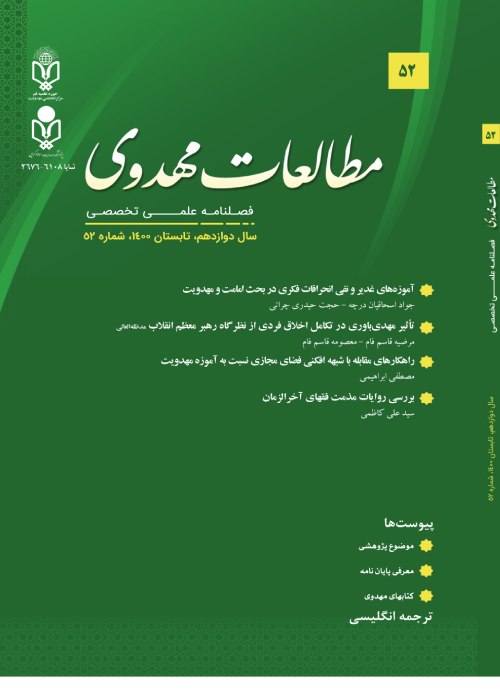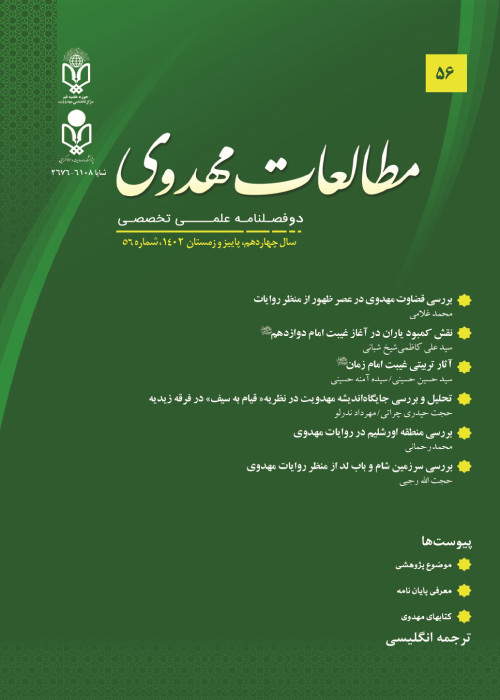فهرست مطالب

نشریه مطالعات مهدوی
پیاپی 52 (تابستان 1400)
- تاریخ انتشار: 1401/11/01
- تعداد عناوین: 6
-
صفحات 7-19
غدیر در جایگاه واقعیتی مهم در تاریخ اسلام، نقطه عطفی در تبیین امامت و استمرار حرکت اسلامی بوده است. حضرت رسول بر اساس دستور الهی، ارتباط وثیق امامت و ولایت را با حاکمیت و اداره امور دنیایی ترسیم فرمودند؛ مبنی بر اینکه محور و معیار حق، همان صراط مستقیم الهی در قالب حجتهای معصوم است و این سیر تا آخرالزمان و امامت امام عصر ادامه خواهد داشت؛ بنابراین بر اساس متون غدیر، از جمله خطبه غدیر و زیارت غدیریه، نظریات انحرافی همچون سکولاریسم، پلورالیسم، قرایتهای متفاوت از دین، تسامح در ارتباط با دشمنان و مخالفان و برداشتهای غلط از خاتمیت و مهدویت، باطل خواهد شد.
کلیدواژگان: خطبه غدیر، زیارت غدیریه، ولایت، امامت، انحرافات فکری، خاتمیت، مهدویت -
صفحات 21-39
این مقاله به روش توصیفی - تحلیلی، به تاثیر مهدیباوری در تکامل اخلاق فردی در پرتو بیانات رهبر معظم انقلاب مد ظله العالی پرداخته است. اعتقاد به مهدویت، اثر فزاینده روانی و جسمی در معتقدان دارد و آنها را در برابر امواج نیرومند فسادهای بیرونی و درونی عالم هستی بیمه میکند. نتایج حاصل از نوشتار حاضر این است که بر پایه فرمودههای حضرت آیت الله خامنهای مد ظله العالی ایجاد و تقویت جهانبینی دینی و تقرب إلی الله و ایجاد اعتقاد راسخ به امام و پیوند مستمر با آن حضرت، از پیامدهای باورداشت به مهدویت در عرصه تکامل اخلاق معرفتی فردی است. از مصادیق این تاثیرگذاری در تکامل عملی و رفتاری، عبارت است از: خودسازی، امیدواری به آیندهای روشن و مبارزه با یاس و ناامیدی، صبر و پایداری در برابر ناملایمات برای فردایی روشن، ایجاد حرکت مضاعف و رشد و نشاط بیشتر در مسیر زندگی فردی، ایجاد روح تعهد و مسیولیتپذیری در فرد، قانع نبودن به وضع موجود و طلب رسیدن به وضع مطلوب، احساس آرامش روانی.
کلیدواژگان: اخلاق رفتاری، اخلاق فردی، اخلاق معرفتی، رهبر معظم انقلاب، مهدی باوری -
صفحات 41-63
در دوران کنونی با شبههافکنیهای غرضورزانه از سوی اشخاص و گروههای مختلف خصوصا در بستر فضای مجازی در برخورد با مباحث دین، مواجه هستیم. در دروان گذشته عموما مردم عادی با مباحث تخصصی و آکادمیک درگیر نبودند و جامعه، غالبا گرفتار تردید آفرینیها در حوزه مسایل دین نمیشد. با توجه به وضع حال جامعه و گسترش روزافزون رسانهها و فضای مجازی، بستر نشر و توزیع حداکثری پرسشها و شبهات دینی، خصوصا در حوزه مباحث مهدویت فراهم شده و بدون وقفه در حال ریزش به سمت مردم به ویژه نوجوانان و جوانان میباشد؛ از این رو مراکز و فعالان دینی به عنوان یکی از نهادهای تاثیرگذار در جامعه در برخورد با موج شدید و سریع فضای مجازی، با فرصتها و چالشهای اساسی مواجه هستند. آنان از یک طرف موظفند از عقاید و آموزه دینی و مسیله مهم مهدویت در برابر شبهات محافظت کنند و از سوی دیگر باید با استفاده از فناوری و فضای گسترده مجازی، از آن برای رسیدن به نشر و توزیع مباحث دینی و مقابله با شبههافکنیهای ضد دینی کمک بگیرند. در این نوشتار به بیان راهکارهای مقابله با چالشهای دینی خصوصا در عرصه مهدویت در فضای مجازی با نگرش بر بیان راهکارهای حکومتی و تخصصی برای استفاده از آن در نهادهای تبلیغی عمومی و شخصی پرداخته شده است. پژوهشگر در این مقاله تلاش کرده است با گردآوری آرا و نظر کارشناسان مختلف، به مطالعه و بررسی راههای متنوع مقابله با نفوذ و شبههافکنی دشمن به وسیله فضای مجازی در اذهان عموم جامعه بپردازد و با معرفی این راه درصدد کمک به حفظ کاربران فضای مجازی از انحراف بوده است.
کلیدواژگان: راهکار های مقابله، شبهه افکنی، فضای مجازی، مهدویت -
صفحات 65-85
همواره مدعیان دروغین، آنچه را که در دین، ارزش بیشتری داشته و مانع فعالیتهای آنها بوده است، بیش از مسایل دیگر مورد هجمه قرار دادهاند. یکی از مسایل مهم که از اولویتهای مبارزاتی مدعیان بوده و همیشه به دنبال تخریب آن هستند، جایگاه عالمان دینی است؛ چرا که منحرفان، عالمان راستین را سد بزرگی بر سر راه خود دیده، تنها راه پیروزی خود را گذر از این مانع پیش روی خود میدانند. اینان برای تخریب جایگاه عالمان، بهترین راه را استفاده از ابزار دین دانسته، از این رو با استناد به تعدادی از روایات، به دنبال تخریب یا تضعیف این جایگاهند. این نوشتار پس از روشن کردن اهمیت رجوع به عالمان در روایات، با روش توصیفیتحلیلی، به بررسی و نقد ادله مدعیان دروغین در مذمت فقهای آخرالزمان پرداخته و در نهایت با بیان ملاکهای تشخیص عالم الهی از غیرالهی، حدود این موضوع را روشن کرده است. با بررسی و تشکیل خانواده حدیثی در این زمینه، روشن میشود که روایات در این زمینه از لحاظ دلالت، به سه دسته صریح، غیرصریح و بیارتباط با موضوع تقسیم میشوند. با بررسی موردی روایات به دست میآید که اولا: بسیاری از این روایات از لحاظ سندی ضعیفند؛ ثانیا: غالبا در کتب متقدم یافت نمیشوند؛ ثالثا: از لحاظ محتوا بر آنچه این افراد ادعا میکنند، دلالتی ندارند؛ و رابعا: این افراد در مواردی، به تقطیع روایات پرداخته و در مواردی نیز به سبب فهم نادرست از روایت، به خطا رفتهاند.
کلیدواژگان: آخرالزمان، فقها، مدعیان دروغین، شبهات مهدویت - پیوست ها
-
صفحات 89-95
-
صفحات 96-100
-
Pages 7-19
Ghadīr-e Khumm as an important historical Islamic fact has been a turning point in the explanation of the Imamate and the continuation of the Islamic movement. The holy prophet Muhammad (pbuh), according to divine order, traced the inseparable correlation between Imamate and the governance and administration of worldly affairs, stating that the criterion of truth is the divine path of God in the form of infallible Imams, and this will continue until the end of Time and the appearance of Imam Mahdi (pbuh) Therefore, according to Ghadīr’s texts including Ghadir’s sermon and Ghadīriyah Ziyārat, deviant ideas such as secularism, pluralism, different interpretations from religion, tolerance in making relation to enemies and opponents, and misconceptions of Khātamiyyat (termination of Prophethood) and Mahdism will be invalidated.
Keywords: Ghadīr-e Khumm sermon, Ghadīriyah Ziyārat, Wilāyat (divine guardianship), Imamate, intellectual deviance, Khātamiyyat (termination of Prophethood), Mahdism -
Pages 21-39
The present paper by using a descriptive-analytic method aims to study the impact of believing in Imam Mahdi (pbuh) on the perfection of individual ethics in the light of the statements of the supreme leader of the Islamic revolution, Imam Khamenei (may Allah prolong his life). To believe in Mahdism has increasing psychological and physical positive effects on the believers and guards them against the external and internal corruption in the universe. The result of this study is that based on the sayings of Ᾱyat Allah Khamenei, creating and strengthening a religious world-view and seeking nearness to Allah, and making a firm belief in the Imam and an unbreakable connection with him are among the consequences of believing in Mahdism in the field of the development of individual epistemological ethics. Some of the examples of this impact on practical and behavioral development are such as self-refinement, being hopeful for a bright future, fighting against hopelessness, patience and resistance in confrontation with woes and miseries for a better future, creating a double attempt and more growth and vitality in the path of individual life, creating the stance of commitment and responsibility in the individual, dissatisfaction with the current situation and seeking to gain the desired situation and feeling of pacification.
Keywords: behavioral ethics, individual ethics, epistemological ethics, the supreme leader of the revolution, Mahdism -
Pages 41-63
Nowadays concerning religious issues, we are faced with intentional doubts by various malicious individuals and groups, especially in the cyberspace context. In the past, ordinary people were not generally involved with specialized and academic subjects, and society was not often faced with doubts in the field of religious teachings. As regards the present state of society and the ever-increasing diffusion of the media and virtual space, a community groundwork has been provided for the maximum publication and distribution of religious questions and doubts, especially in the field of Mahdism; and it is continuously influencing the people, especially teenagers and young people. Hence, religious centers, as influential social institutions, are facing major challenges and also opportunities in dealing with cyberspace. On the one hand, they are assigned to protect the religious beliefs, and teachings and specially Mahdism, from doubts; and on the other hand, they should use modern technology and the vast virtual space to publish and distribute religious subjects and to deal with anti-religious doubts. In this present paper, with the view of governmental and specialized solutions in the public and personal propagandistic constitutions, we discuss some solutions to confront the religious challenges especially in the field of Mahdism in the virtual space. The researcher, in this article, tries to collect different experts’ opinions to study various ways of dealing with the influence and suspicion of the enemy through cyberspace in the minds of the public to help protect the users of cyberspace from deviation. have been.
Keywords: the strategies of confrontation, doubting, cyberspace, Mahdism -
Pages 65-85
False claimants of Mahdism have always derogated more valuable issues in the religion, which hinder their activities more than the others. The essential and high position of ˈUlamās (Islamic scholars), as one of the important issues, is one of the false claimants’ priorities and they always seek to destroy it; because the deviants know that the true scholars are like a big obstacle to their way hence, they consider the only way to win is to pass this obstacle facing. Also, they believe that the most effective way to destroy the status of the scholars is to use religious means, so they seek to destroy or weaken this position by citing some Hadiths. After clarifying the sayings of the Hadiths about the importance of referring to the scholars, this article by using a descriptive-analytical method attempts to examine and criticize the arguments of the false claimants in condemning ˈUlamās (Islamic scholars) of the end of Time; and finally, this article clarifies the various scopes of this issue by stating the criteria for distinguishing the divine scholars from the non-divine ones. By studying and forming an Islamic narrative collection in this field, it becomes clear that the Hadiths in this field are divided into three categories in terms of meaning: explicit, non-explicit, and unrelated narrations. According to this survey, it becomes clear that firstly, many of these narrations are weak in terms of documentation; secondly, they are often not found in the old and earlier Hadith books; thirdly, in terms of content, the Hadiths do not imply what those claimers say; and fourthly, false claimants have in some cases intersected the Hadiths, and in some cases, they have gone wrong due to an incorrect understanding of the Hadith.
Keywords: the end of Time, jurists (Islamic scholars), false claimants, Mahdism doubts


